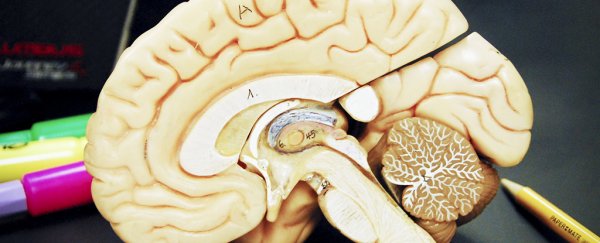The thalamus is a small region that sits in the centre of our brain, and is thought to relay signals from our ears, eyes, mouth and skin to other parts of the brain for processing.
But a new study suggests that it's not just passing on information - it also plays a role in cognitive behaviours, such as making decisions and staying focussed. If we can get to the bottom of the thalamus's true capabilities in humans, it could help us treat a variety of brain-related health problems, from schizophrenia to insomnia.
Working with mice and computer simulations, researchers from the New York University Langone Medical Centre found that not only is the thalamus passing on sensory signals in the brain - it's strengthening neural connections at the same time.
This helps our brain determine what we should be paying attention to when we make decisions, meaning the thalamus could play a much larger role in certain human behaviours than we've given it credit for.
"Our study provides the clearest demonstration to date that the mediodorsal thalamus, or MD, may be the conductor of connectivity between circuits as the brain attends to previously learned rules and makes decisions in real time," says one of the researchers, Michael Halassa.
The team worked with mice to determine how two parts of the thalamus interacted: the prefrontal cortex (PFC), responsible for working memory and decision-making; and the mediodorsal thalamus (MD), a large nuclei inside the thalamus.
Mice were tasked with responding to flashes of light and sounds to get a food reward, then remembering what they'd learned. Special light-sensitive proteins were injected into the PFC and MD so the researchers could stimulate them artificially.
They found that enhancing MD activity boosted the animals' ability to pick the right option based on previous training: the mice made 25 percent fewer mistakes when recognising the right food trigger - learning from rules gained by experience.
But when the PFC activity was increased instead, the ability of the mice to choose wisely dropped to as low as 50-50 in some cases.
This suggests that connections between neurons with conflicting 'rules' about how the mice should act were being fired at the same time, and they interferred with each other in such a way that the mice struggled to make a decision.
That means increased MD activity could help the mammalian brain choose the right neurons for a particular decision based on context, elevating the role of the thalamus from something like a gate to more of a signpost.
Of course, the results of the study have so far only been observed in mice, so until they're replicated in humans, we can't be certain that they'll translate.
But if the findings play out in humans as well, it could affect how we treat disorders related attention, such as insomnia and schizophrenia - for example, if a lack of attention is linked to sleeping difficulties or certain types of psychosis, we might be able to tweak how the thalamus functions.
"This new understanding … implicates the thalamus in cognitive deficits that come with diseases known to proceed from connection problems in the cortex," says Halassa.
"Our results support the theory that cognition in general could be improved by adjusting thalamic function."
The findings have been published in Nature.
